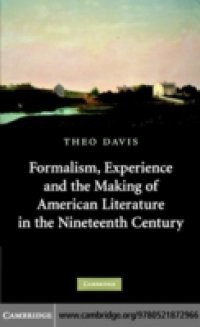Theo Davis offers a fresh account of the emergence of a national literature in the United States. Taking American literature's universalism as an organising force that must be explained rather than simply exposed, she contends that Emerson, Hawthorne, and Stowe's often noted investigations of experience are actually based in a belief that experience is an abstract category governed by typicality, not the property of the individual subject. Additionally, these authors locate the form of the literary work in the domain of abstract experience, projected out of - not embodied in - the text. After tracing the emergence of these beliefs out of Scottish common sense philosophy and through early American literary criticism, Davis analyses how American authors' prose seeks to work an art of abstract experience. In so doing, she reconsiders the place of form in modern literary studies.

